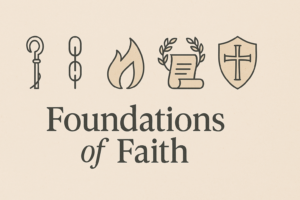
Estimated reading time: 9 minutes
Key Takeaways
- The Free Will Defense, formulated by Alvin Plantinga, addresses the Problem of Evil by emphasizing the value of free will.
- Free will is presented as a greater good that justifies the existence of evil in a world created by God.
- Plantinga’s argument tackles both moral and natural evil, offering a comprehensive philosophical perspective.
- The Free Will Defense challenges the Logical Problem of Evil by asserting the compatibility of God’s omnipotence with the existence of evil.
- This defense has significantly influenced philosophical debates and continues to inspire discussions in religious philosophy.
Table of Contents
- Introduction: The Problem of Evil
- 1. Alvin Plantinga’s Groundbreaking Argument
- 2. The Intrinsic Value of Free Will
- 3. The Logical Problem of Evil
- 4. Addressing Moral Evil
- 5. Dealing with Natural Evil
- 6. Commendable Simplicity
- 7. Widespread Influence
- Conclusion: A Fresh Perspective on an Ancient Problem
- Frequently Asked Questions
Introduction: The Problem of Evil
Rapidly becoming one of the key arguments in contemporary philosophy, the “free will defense” stands as a challenger against the classical problem of evil. The problem of evil, a paradoxical concept that questions the compatibility of God’s omnipotence and benevolence with the existence of evil, has been a longstanding conundrum. Conversely, the free will defense turns this problem on its head, providing a theoretically sound explanation. In this comprehensive guide, we unravel seven insightful aspects of the free will defense argument and how they offer inspiring interpretations of this philosophical problem.
1. Alvin Plantinga’s Groundbreaking Argument
The Free Will Defense originated in the brilliant mind of Alvin Plantinga, a renowned American philosopher recognized for his defense of orthodox Christian beliefs in the realms of metaphysics (source). Plantinga addresses the problem of evil by asserting that free will is a superior good that justifies the potential for evil. He argues that it is possible that God, even being omnipotent, could not create a world where free will exists without the possibility of evil.
2. The Intrinsic Value of Free Will
One of the most inspiring elements of the Free Will Defense is its emphasis on the intrinsic value of free will. It posits that a world with free-willed beings capable of both good and evil is more valuable than one where goodness is simply programmed (source). This perspective offers a novel way to perceive the existence of evil, celebrating the human capacity to choose right from wrong (source).
3. The Logical Problem of Evil
Plantinga’s argument successfully dispels the classical logical problem of evil (source). He concludes it is not logically consistent to claim that an all-powerful, all-knowing, and all-good God cannot exist in a world where evil also exists (source). Thus, the Free Will Defense provides a paradigm shift in resolving the perceived paradox between divinity and mortality.
4. Addressing Moral Evil
The Free Will Defense directly tackles moral evil, the type of evil that results from human actions. According to this defense, moral evil exists because humans, endowed with free will, sometimes choose to commit evil acts (source). This interpretation provides a more nuanced understanding of the complexity of human existence and our inherent capacity for both good and evil (source).
5. Dealing with Natural Evil
While the Free Will Defense primarily addresses moral evil, it also offers insight into natural evil—evils not directly caused by free human action, such as natural disasters and diseases. Plantinga proposes that natural evil could be the result of the actions of free agents who are not human (source) (source).
6. Commendable Simplicity
Despite dealing with profound philosophical questions, the Free Will Defense is marked by its simplicity and accessibility. It relies on intuitive ideas about freedom, morality, and choice, making it an engaging and approachable philosophical argument (source).
7. Widespread Influence
The Free Will Defense has made significant waves in the domain of religious philosophy, inspiring other philosophers to develop their versions or counterarguments. It remains a cornerstone argument in Christian apologetics and continues to generate lively debates (source).
Conclusion: A Fresh Perspective on an Ancient Problem
The Free Will Defense offers a groundbreaking analysis of the Problem of Evil—an analysis that affirms the value of free will and offers fresh insights into the co-existence of good and evil. These seven insights into the Free Will Defense demonstrate that, irrespective of belief, this argument remains significant in its power to inspire philosophical inquiry and dialogue.
The Free Will Defense’s fascinating approach to deciphering the paradox of good and evil has captivated countless thinkers. Like an open-ended moral maze, this philosophical gem continues to provoke minds, spurring debates and reshaping perceptions about good, evil, and the very essence of human choice.
Frequently Asked Questions
What is the Free Will Defense?
The Free Will Defense is a philosophical argument that asserts the existence of free will justifies the presence of evil in the world. It suggests that free will is a greater good that allows humans to make genuine choices between good and evil.
How does Alvin Plantinga address the Problem of Evil?
Alvin Plantinga addresses the Problem of Evil by proposing that an omnipotent God could not create a world with free will without also allowing the possibility of evil. His Free Will Defense argues that the existence of evil is compatible with God’s omnipotence and benevolence.
What is the difference between moral evil and natural evil?
Moral evil refers to evils that result from human actions, such as murder or theft. Natural evil refers to suffering not caused by human actions, like natural disasters or diseases. The Free Will Defense primarily addresses moral evil but also offers insights into natural evil.
How does the Free Will Defense impact philosophical debates about God and evil?
The Free Will Defense has significantly influenced philosophical and theological discussions by providing a compelling argument that reconciles the existence of an all-powerful, all-good God with the presence of evil in the world. It challenges the Logical Problem of Evil and remains a central topic in debates on the subject.



